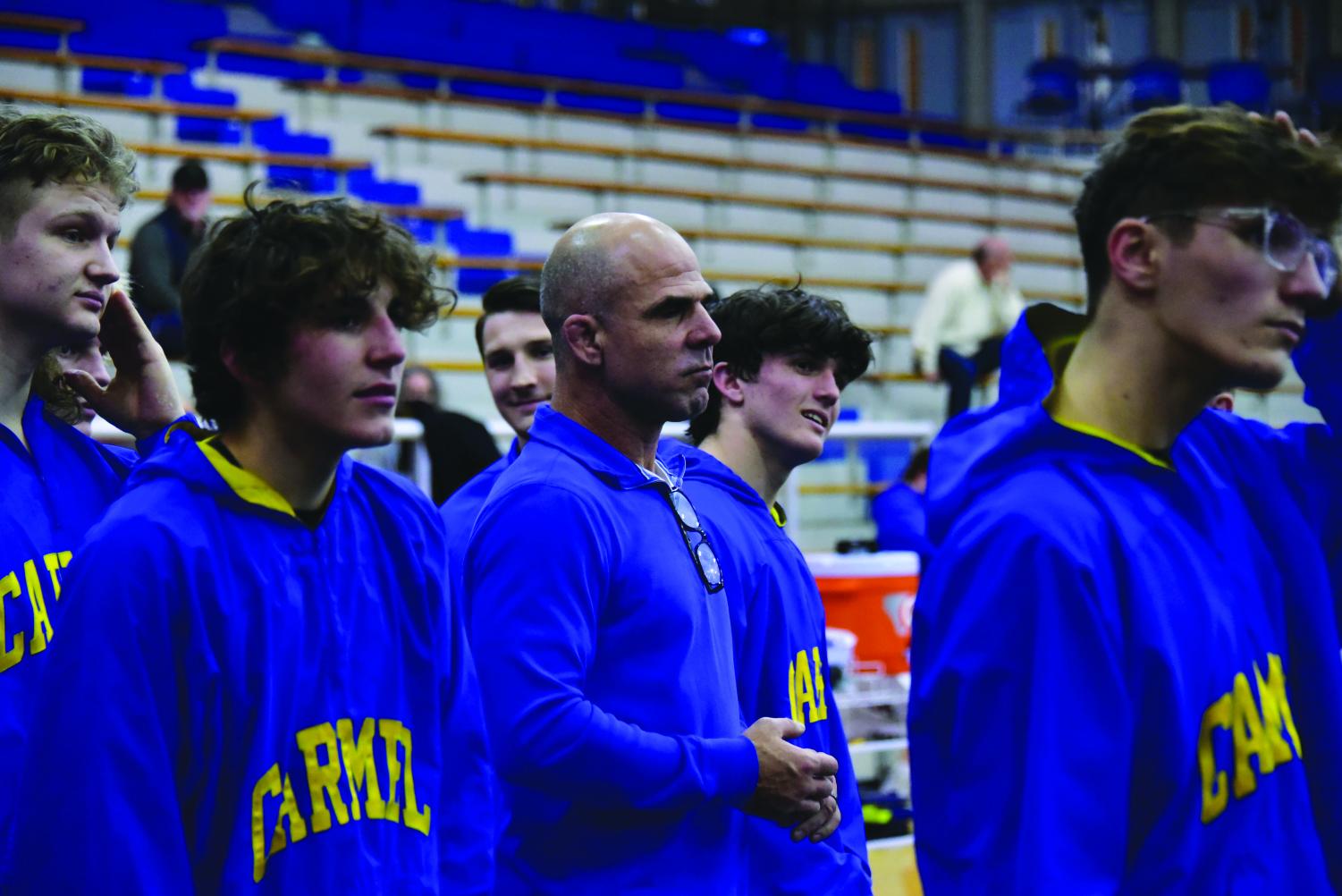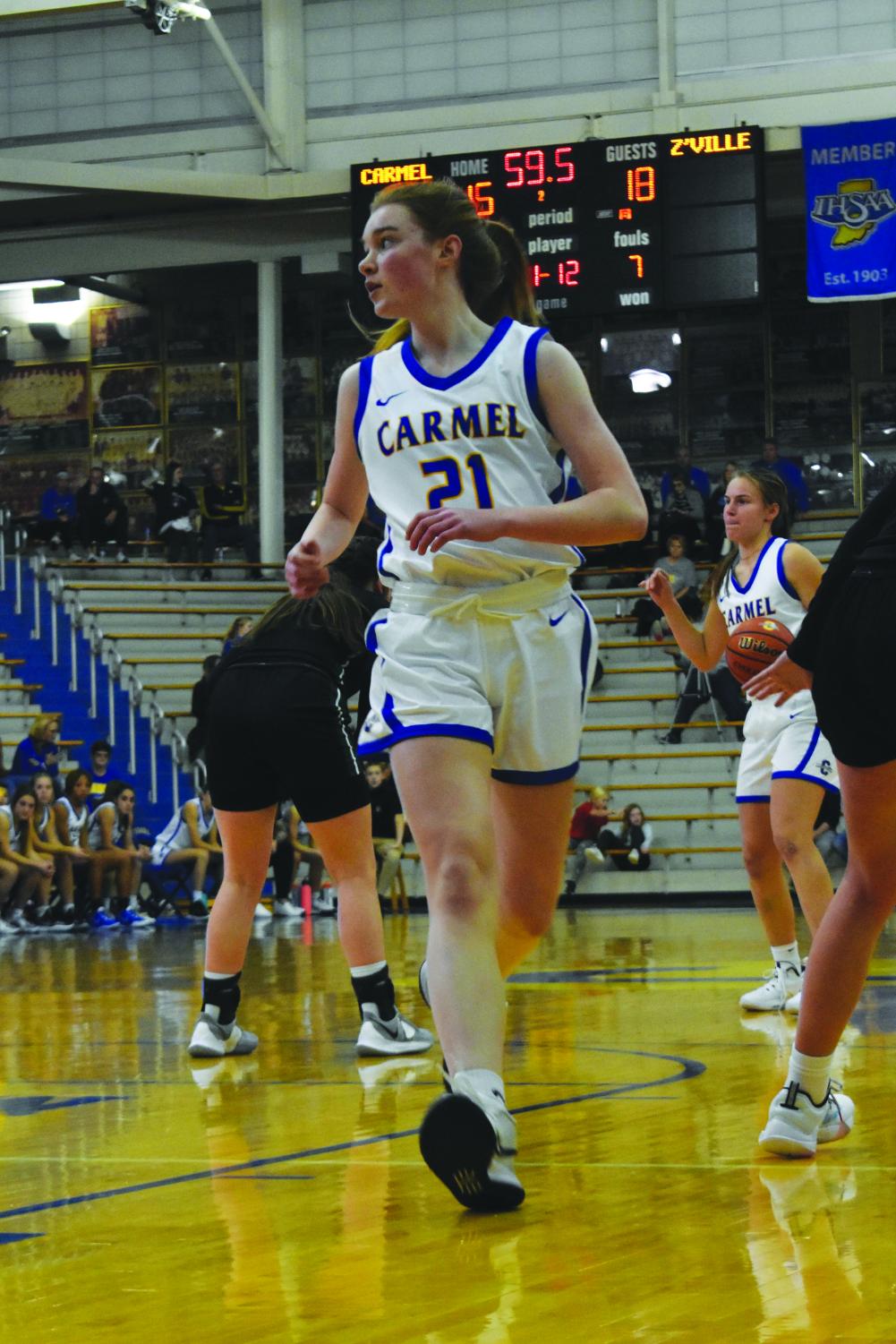To date, Carmel athletic teams have earned 157 team state championships. That kind of success often puts coaching staff in the public eye. It is inevitable for high school coaches at this school to experience some form of pressure. This is reflected in a popular 2020 Netflix show “The Playbook: A Coach’s Rules For Life” a docuseries about some of the most legendary coaches in athletics. In each episode, a highly respected coach outlines his or her basic principles of coaching and the responsibilities that come with it. Those coaches give perspectives on how they deal with the pressure and burdens of being a well-rounded coach.
Locally, Ed Pendoski, head coach of the wrestling team, said he always feels responsible when his team performs poorly, but accountability within the team is also important.
“If bad things happen, who’s at fault? If everybody holds themselves accountable, that’s going to make things easier to fix,” he said.

Jamie Elliott, women’s basketball player and sophomore, said she also feels that coaches take accountability for the team’s performance but the players should also share the burden.
“If a team performs poorly, the responsibility should not be placed on a specific person,” she said. “Everyone on the team, including coaches, should be held accountable for that, definitely not one or two people or the coach.”
Feeling pressure as coach isn’t just prevalent in high school, but on a collegiate level as well. According to ESPN, following the COVID-19 pandemic, many college football coaches like Will Muschamp and Derek Mason, were in “the hot seat” or the public eye, with pressures to have successful teams following time off football.
Additionally, Pendoski said coaching has a lot to do with the environment of the team, and that in wrestling, team chemistry is especially important.
“One unique thing about wrestling is that the team is usually very close,” he said. “Last week when we went to Mooresville, we took 13 athletes and three coaches. Between the two days we spent 20 hours in the gym together, so in between there’s a lot of time to interact.”
This attitude was not only represented in the coaches eyes, but through athletes as well. Matthew Paraboschi, member of the men’s wrestling team and sophomore, also said the environment surrounding the team is crucial to its success.
“(Coaches) try very hard to create culture within the team to foster chemistry between all of us,” he said.
Pendoski agreed with this sentiment and said building a relationship with athletes and preparing them for the real world is a crucial part of being a coach.
“When (wrestlers) go through the difficulties that you have to go through in a wrestling practice and the coaches are there and doing it with them—you know wrestling and competing and doing al
l these things—there’s a connection (that forms),” Pendoski said.
Paraboschi said he feels his coach motivates him by pushing him to be his best and recognize his growth.
“Our coaches hope we win our matches, but they want to see us showing perseverance and growth,” Paraboschi said. “For example, at the Yorktown wrestling tournament I got beat up on by my opponent and lost, but because I fought until the end Coach Pendoski told me he loved the match.”
Pendoski said he wants his athletes to learn life lessons as they compete in sports.
“Student athletes want to compete and want to win and that’s a really good goal that we have but the most important job we have as a coaching staff is to put these kids in an athletic playing field and let them go through some experiences that will benefit them later in life,” Pendoski said.

Elliot said she has learned life lessons including the idea that a strong bond between players and coaches is rooted in trust.
“The relationships that the coaches build with players is very important. With communication and respect, trust is built and both the players and coaches feel comfortable working together,” Elliott said. “When my coaches have shown that they truly care about my success and development on and off the court, our relationship strengthens and I am able to trust them and buy in more.”
Ultimately, Pendoski said he believes a coach’s success is measured, not by wins and losses, but by how many former athletes remain in touch.
“I read a quote once from another coach that was ‘You can tell how successful a coach was by how many athletes talk to them after they’re gone,’” he said. “I think you measure the quality of a good coach by how many athletes stick around.”




























![Keep the New Gloves: Fighter Safety Is Non-Negotiable [opinion]](https://hilite.org/wp-content/uploads/2024/12/ufcglovescolumncover-1200x471.png)
















































![Review: “We Live in Time” leaves you wanting more [MUSE]](https://hilite.org/wp-content/uploads/2024/12/IMG_6358.jpg)
![Review: The premise of "Culinary Class Wars" is refreshingly unique and deserving of more attention [MUSE]](https://hilite.org/wp-content/uploads/2024/12/MUSE-class-wars-cover-2.png)
![Introducing: "The Muses Who Stole Christmas," a collection of reviews for you to follow through winter [MUSE]](https://hilite.org/wp-content/uploads/2024/12/winter-muse-4.gif)
![Review: "Meet Me Next Christmas" is a cheesy and predictable watch, but it was worth every minute [MUSE]](https://hilite.org/wp-content/uploads/2024/11/AAAAQVfRG2gwEuLhXTGm3856HuX2MTNs31Ok7fGgIVCoZbyeugVs1F4DZs-DgP0XadTDrnXHlbQo4DerjRXand9H1JKPM06cENmLl2RsINud2DMqIHzpXFS2n4zOkL3dr5m5i0nIVb3Cu3ataT_W2zGeDAJNd_E-1200x884.jpg)
![Review: "Gilmore Girls", the perfect fall show [MUSE]](https://hilite.org/wp-content/uploads/2024/11/gilmore-girls.png)
![Review in Print: Maripaz Villar brings a delightfully unique style to the world of WEBTOON [MUSE]](https://hilite.org/wp-content/uploads/2023/12/maripazcover-1200x960.jpg)
![Review: “The Sword of Kaigen” is a masterpiece [MUSE]](https://hilite.org/wp-content/uploads/2023/11/Screenshot-2023-11-26-201051.png)
![Review: Gateron Oil Kings, great linear switches, okay price [MUSE]](https://hilite.org/wp-content/uploads/2023/11/Screenshot-2023-11-26-200553.png)
![Review: “A Haunting in Venice” is a significant improvement from other Agatha Christie adaptations [MUSE]](https://hilite.org/wp-content/uploads/2023/11/e7ee2938a6d422669771bce6d8088521.jpg)
![Review: A Thanksgiving story from elementary school, still just as interesting [MUSE]](https://hilite.org/wp-content/uploads/2023/11/Screenshot-2023-11-26-195514-987x1200.png)
![Review: "When I Fly Towards You", cute, uplifting youth drama [MUSE]](https://hilite.org/wp-content/uploads/2023/09/When-I-Fly-Towards-You-Chinese-drama.png)
![Postcards from Muse: Hawaii Travel Diary [MUSE]](https://hilite.org/wp-content/uploads/2023/09/My-project-1-1200x1200.jpg)
![Review: "Ladybug & Cat Noir: The Movie," departure from original show [MUSE]](https://hilite.org/wp-content/uploads/2023/09/Ladybug__Cat_Noir_-_The_Movie_poster.jpg)
![Review in Print: "Hidden Love" is the cute, uplifting drama everyone needs [MUSE]](https://hilite.org/wp-content/uploads/2023/09/hiddenlovecover-e1693597208225-1030x1200.png)
![Review in Print: "Heartstopper" is the heartwarming queer romance we all need [MUSE]](https://hilite.org/wp-content/uploads/2023/08/museheartstoppercover-1200x654.png)



